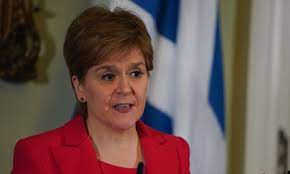Simon Jenkins
An independent Scotland has not been hindered by Nicola Sturgeon’s departure; it could well be advanced by it. Her eight years as first minister have been remarkable, but failed to bring statehood closer to reality. The question is whether her intransigence postponed it. Sturgeon made a strategic error after her predecessor Alex Salmond lost the 2014 independence referendum. She assumed her charisma could swiftly erode the 55% turnout for continued union with England and secure a victorious rerun of the poll. Despite her electoral successes, she never seriously dented that majority. All Sturgeon could do was plunge an ever more visceral anti-Englishness into courtroom battles with London that she was never likely to win.
Salmond had in 2014 foolishly rejected David Cameron’s offer of a second referendum option for so-called “devo max”, a radically enhanced Scottish autonomy. This would certainly have passed, with polls indicating 66% support among Scottish voters. While devo max was a constitutional can of worms, it could not have been wished away. It should have begun a drastic restructuring of the Scottish economy away from dependence on – and therefore control from – London. At very least it would have put serious autonomy within the realm of plausibility. The question now is how far could a new SNP leader take such a move towards greater autonomy forward, possibly aided by sensible and open-minded leaders of the Labour and Tory parties. To Sturgeon, the issue bordered on the theological. As with Salmond, it was freedom or bust, independence or serfdom. They wanted their own currency, their own debt, a hard border with England, membership of the EU and no UK weapons on Scottish soil. This was fantasy enough but at no point did it engage in the elephant in the independence room – economics.
Gazing across the Irish Sea, we can all study Ireland’s experience since independence a century ago, when under British rule it was among the poorest nations in Europe. Depending on definition, it is today one of the most prosperous. But it took Dublin 50 years of austerity and pain – including a meagre welfare state – to get there. Not until the 1980s did it achieve such key indicators of growth as a net inflow of investment, population and talent, and “Celtic tiger” status. There is no tartan tiger. Sturgeon’s leadership enabled the Scots to have their cake and eat it. Her fierce nationalism gave voters emotional satisfaction. She ran hospitals, schools, trains, law and order, while Covid gave Scotland a degree of administrative discretion. Limited scope to raise top income taxes allowed a generous family support package and free student tuition. But this did not deliver the Scottish people conspicuously better services, and it depended heavily on an annual subsidy from London.
Scotland’s budget deficit in 2020-21 of 22% of GDP was among the largest of any nation in the western world, though surging oil and gas revenues have recently cut it back. Similarly sized Denmark runs a surplus of 4%. The annual UK government grant to Scotland announced last October was a record £41bn. This is money a Scottish treasury would have to find on its own, which is why Scotland’s standard of living needs union into the foreseeable future. As Ireland shows, there is a path out of dependency, but it is neither easy nor swift. Federal constitutions in Spain, Switzerland and Germany indicate that the key to autonomy lies in fiscal freedom, in the capacity to grow, earn and spend, independent of policies ordained by a central government. The Basques and the Swiss cantons enjoy fiscal discretions unthinkable to the British Treasury – but the key lies in fiscal self-sufficiency. Advocates of independence persistently fail to confront this.
There is no reason why Scotland cannot approach the prosperity of Ireland or Scandinavia. Decades of reliance on the most centralist political economy in Europe – that of the UK – have crippled Scotland, Wales and Northern Ireland. Devo max might aim to embrace some of Ireland’s libertarian taxes along with Norway’s links to the EU’s single market. It might conceivably join with Northern Ireland in its revitalised Brexit protocol, ingeniously returning to the EU’s trading regime and yet free to trade with England. A digital border would be complicated, as Ireland is showing, but it would honour the clear vote of a majority of Scots against Brexit.
The concept of devo max – so-called “full fiscal autonomy” or “radical federalism” – is now debated by many on the fringes of the independence debate, in Wales as well as Scotland. The effort is to move forward from political confrontation. Federalism covers a spectrum of options but its purpose is to offer Scotland a freer hand to raise and spend public money, while offering London relief from a heavy burden in Scotland. It would be what Ireland was denied by England in the 19th century, true home rule under the crown. Had it been granted, the old United Kingdom might still be one. As for Sturgeon’s successor, such an outcome could deliver a new Scotland mercifully at peace with London. Or it could prepare a path to full independence if that were, in my view sadly, to be Scotland’s eventual choice.







